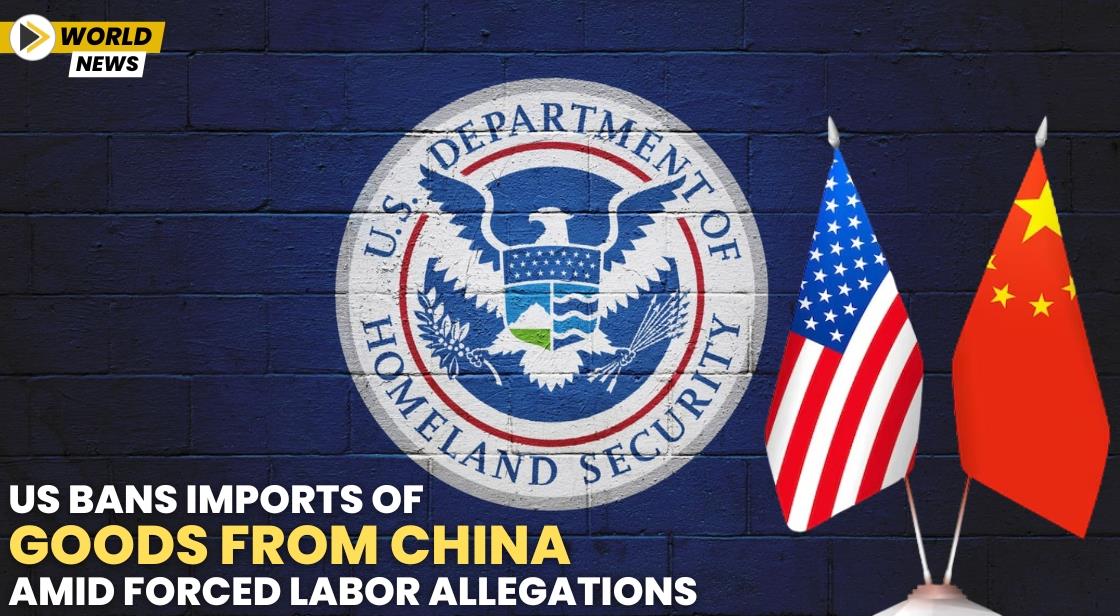US Bans Imports of Goods from China Amid Forced Labor Allegations

News Synopsis
The US Department of Homeland Security (DHS) announced a significant move on Wednesday, banning the import of goods from two Chinese companies: a steel manufacturer and a producer of artificial sweeteners. This action is based on allegations that these firms are involved in forced labor practices linked to the Uyghur ethnic group and other Muslim minorities in China’s far-west region of Xinjiang.
Expansion on the Ban
This recent decision is part of a broader initiative by the US government to prevent products associated with human rights abuses from entering the country. The entities identified in this latest round of sanctions are the first steel and aspartame manufacturers from China to be added to the US's entity list under the Uyghur Forced Labor Prevention Act. This law was enacted to combat the alleged exploitation of labor in Xinjiang, where numerous reports have emerged regarding human rights violations against Uyghurs.
"Today's actions reaffirm our commitment to eliminating forced labour from US supply chains and upholding our values of human rights for all," stated Robert Silvers, Undersecretary of Homeland Security for Policy. He emphasized that "no sector is off-limits," indicating that the government intends to pursue a rigorous approach in identifying and sanctioning entities that exploit labor.
Context of the Action
The legal framework for this ban is grounded in a federal law signed by President Joe Biden at the end of 2021. This legislation came in response to allegations of severe human rights abuses by the Chinese government against the Uyghur population and other Muslim minorities in Xinjiang. These abuses include forced labor, mass detentions, and other forms of systemic oppression.
In contrast, the Chinese government has vigorously denied these accusations, labeling them as "lies." Officials argue that their policies in Xinjiang are aimed at combating terrorism and ensuring stability in the region. This ban signifies a shift in the US trade relationship with China, increasingly intertwining national security concerns with human rights issues.
Implications for US-China Relations
The decision to target Chinese companies over human rights issues underscores a significant pivot in US-China relations, where trade policies are increasingly scrutinized through the lens of ethical considerations. Beijing has condemned these actions, claiming that the US is using human rights as a pretext to hinder China’s economic development.
What is US Department of Homeland Security (DHS)
The U.S. Department of Homeland Security (DHS) is a federal executive department of the United States government, created in response to the September 11, 2001, terrorist attacks. Its primary mission is to protect the American people, infrastructure, and homeland from a variety of threats, including terrorism, natural disasters, and other emergencies. Here are key points about DHS:
Overview
-
Formation: DHS was established on November 25, 2002, by the Homeland Security Act of 2002, consolidating several federal agencies to improve coordination and response to security threats.
-
Headquarters: The department is headquartered in Washington, D.C.
-
Leadership: The DHS is led by the Secretary of Homeland Security, a cabinet-level position. The Secretary is responsible for coordinating the nation's response to domestic threats.
Key Responsibilities
DHS is tasked with a wide range of functions, which can be categorized into several key areas:
-
Terrorism Prevention: Preventing terrorist attacks on U.S. soil through intelligence gathering, information sharing, and law enforcement efforts.
-
Border Security: Managing and securing U.S. borders to prevent illegal immigration and smuggling while facilitating lawful trade and travel.
-
Disaster Response: Coordinating federal disaster response and recovery efforts, including natural disasters such as hurricanes, floods, and wildfires.
-
Cybersecurity: Protecting the nation’s critical infrastructure from cyber threats and promoting cybersecurity awareness among individuals and organizations.
-
Immigration Services: Overseeing lawful immigration processes and enforcement of immigration laws, including the U.S. Citizenship and Immigration Services (USCIS).
-
Transportation Security: Ensuring the security of transportation systems, including air travel, through agencies like the Transportation Security Administration (TSA).
-
Emergency Management: Supporting state and local governments in preparing for and responding to emergencies through the Federal Emergency Management Agency (FEMA).
Agencies Under DHS
DHS comprises several key agencies, including:
-
U.S. Coast Guard
-
Cybersecurity and Infrastructure Security Agency (CISA)
Overall, the Department of Homeland Security plays a crucial role in maintaining the safety and security of the United States by addressing various threats and coordinating efforts across multiple agencies. Its work is critical in the context of national security, emergency management, and the protection of civil rights.
Conclusion
The DHS's ban on imports from Chinese companies associated with forced labor reflects the US government's ongoing commitment to addressing human rights abuses. This decision not only signals a tougher stance on China but also highlights the growing intersection of trade and ethical practices in international relations. As the US continues to navigate its complex relationship with China, further actions can be expected in the realm of trade policies, particularly those related to human rights and labor practices.









